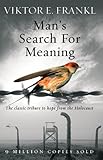 Category: Psychology/Philosophy.
Category: Psychology/Philosophy.
Target audience: General.
How challenging is it to read?:The first section straight forward, the section on logotherapy more challenging though not too technical.
It’s not often I read a book that brings tears to my eyes, but Man’s Search for Meaning by Viktor E. Frankl did just that. Frankl uses his experiences as a Jewish prisoner in Nazi concentration camps to illustrate his own branch of psychotherapy, which he terms Logotherapy. He postulates that we humans need meaning in our lives to exist. When meaning has gone we see little reason to stay alive any longer. If we have a clear reason to live, something definite to live for, then we can survive regardless of what challenges are presented to us. Frankl quotes Neitzsche;
“He who has a why to live for can bear almost any how.“
This quote reverberates throughout the book and illustrates the essence of Logotherapy beautifully. Frankl supports this theory by recounting fellow prisoners who lost their grip on what that meaning for them was. When these prisoners could find no meaning to their lives and no meaning to their suffering, many of them gave up the will to live. In this passage, Frankl describes what often happened to these men:
“Usually it began with the prisoner refusing one morning to get dressed and wash or go out on the parade grounds. No entreaties, no blows, no threats had any effect. He just lay there, hardly moving. If this crisis was brought about by an illness he refused to be taken to the sick-bay or to do anything to help himself. He simply gave up. There he remained, lying in his own excreta, and nothing bothered him any more.” V. Frankl p82-83
So how are these horrendous experiences of half a century ago relevant to us today and what can we learn from this book? I believe there is true value in reading in detail what it was like to live in the Nazi death camps. Frankl writes eloquently about the routines the prisoners had within the camp, the food shortages they had to endure and the punishing, seemingly endless work details the prisoners were sent on, and sometimes did not return from. The descriptions genuinely and significantly moved me. When Frankl describes the suffering and pain the prisoners experienced daily and the cruelty they withstood I feel shocked and deeply saddened that one group of humans could enforce such misery on another. It’s important we don’t forget the depths that human beings can descend to and make sure that such abhorrences are never repeated again.
Frankl talks in his book about detaching himself from the misery of every day existence in the camps and using the experience as a kind of live experiment in human psychology. Through this his life becomes more bearable and he learns much about human behaviour.
The second part of the book gives a summary of Logotherapy. Frankl discusses the importance of meaning in our lives and states that when it is missing we exibit “existential frustration”. This could be outwardly displayed by the prisoner in the death camp letting life slip out of him or the unemployed person slipping into deep depression. Frankl recalls a client who had a high powered diplomatic position in the American government coming to see him because he felt discontented with life. The diplomat had undergone five years of psychoanalysis with little improvement to his condition. Frankl quickly deduced that the client was unhappy in his work and saw little point in it. With encouragement from Frankl the client changed careers into a job that he really wanted to do and though much more poorly paid, remained contented for the five years Frankl stayed in touch with him.
The idea that life needs meaning in order to give contentment fits in with the philosophy of Acceptance and Commitment Therapy too. In ACT the focus is on leading a values focused life rather than a goal focused one. If we live by our values then we are rewarded with meaning continually. We don’t have to wait until we have achieved a set goal in order to feel content.
I’m not sure “enjoyed” is a word I can use to describe how I felt about reading a book that details the events of the holocaust so vividly. Life is not always about enjoying things. The book reminded me of the atrocities that took place in the concentration camps and the lessons we could all learn from this. This book was my first insight into logotherapy. It explained it well and I can see the many links the modality has with my interests in Transactional Analysis and ACT. I will be reading more on the subject I’m sure.
If you wish to have Transactional Analysis therapy in Manchester with me, please contact me using my form or phone me on 07966 390857
 When the tough times hit do you find yourself having the same familiar response? Do you find yourself in the same situations and feeling the same negative feelings? In transactional analysis language, we call these old familiar feelings racket feelings. We can collect up these feelings and cash them in later for a prize. This is called “stamp collecting” in Transactional Analysis after the old loyalty scheme system of being given trading stamps when making a purchase at a shop (think Tesco club card in the 70’s!)
When the tough times hit do you find yourself having the same familiar response? Do you find yourself in the same situations and feeling the same negative feelings? In transactional analysis language, we call these old familiar feelings racket feelings. We can collect up these feelings and cash them in later for a prize. This is called “stamp collecting” in Transactional Analysis after the old loyalty scheme system of being given trading stamps when making a purchase at a shop (think Tesco club card in the 70’s!) I am a lucky man because I work in two areas that I enjoy and find fascinating. These are the vocations of teaching and psychotherapy and I love it when they come together. This is lucky because they come together frequently. In fact they’re rarely apart. Teaching is about relationships. Psychotherapy is about relationships. They are made for each other.
I am a lucky man because I work in two areas that I enjoy and find fascinating. These are the vocations of teaching and psychotherapy and I love it when they come together. This is lucky because they come together frequently. In fact they’re rarely apart. Teaching is about relationships. Psychotherapy is about relationships. They are made for each other.